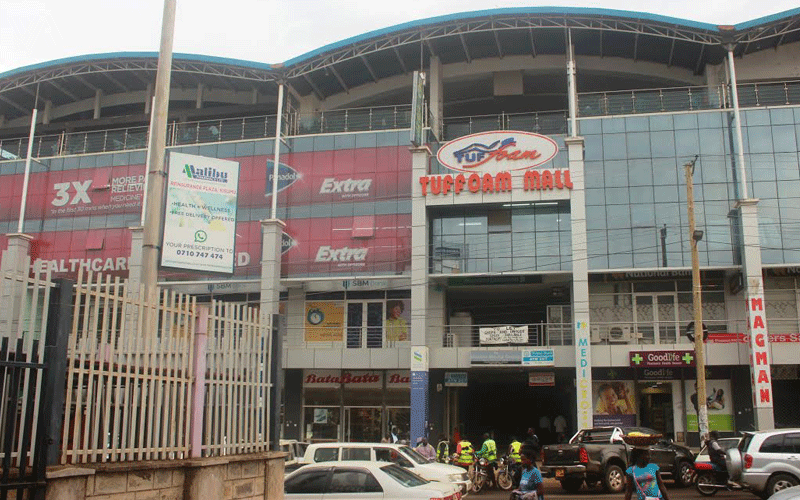Kisumu office space landlords stare at a tougher times ahead

Since coronavirus pandemic swept through the country, many tenants have struggled to keep their businesses afloat, let alone pay their rent on time. The lakeside city’s office space and retail market have not been spared from the brunt as property owners watch their tenants leave their premises due to dwindling incomes.
The Covid-19 outbreak in the country in March this year sparked off an unprecedented situation.
Mandatory lockdowns and social distancing forced companies to ask employees to work from home, ensuring their health and safety.
This flexible and remote working in major cities has caused a heavy blow to the property market and real estate players are hinting at a further shakeup, especially for the office space and retail segments of the property market.
The onset of devolved governments attracted government institutions, private investors, and entrepreneurs to the county headquarters.
Kisumu experienced a demand for office space, retail space and residential units to host all the investors and government officials.
This attracted investors into the construction of office and retail properties.
However, with the economic downturn experienced after the 2017 elections, office space uptake remained low occassioning an oversuply market that left investors without cash inflows.
Galib Tejpar, a property developer in Kisumu and the owner of Corner House Development Limited predicts that going forward, the sector could be staring at tough times as more companies continue to seek to reduce spending on office tenancy.
This is a huge blow for landlords considering that as late as 2019, the sector was already experiencing an oversupply of office space amidst an economic slowdown caused by the Covid-19 pandemic, which has been eroding margins and left units empty.
So far, Tejpar says some international organisations have hinted at reviewing their office space requirements while renewing their lease as a cost-cutting approach to their businesses.
“We are likely to experience prolonged low business returns in the office space as organisations reorganise their tenancy expenditure,” explains Tejpar.
The situation, he says, has been made worse by the new wave of coronavirus spread that is threatening to close down the country for the second time, disrupting plans to resume regular work and production.
With the low demand, tenancy levels at malls and retail shops dropped slightly, leaving developers with the daunting challenge of finding occupants.
Despite the resurgence of Covid-19 cases and slow market response, however, property investors in the two sub-sectors are upbeat about gradual recovery following the not so stringent measures put in place by President Uhuru Kenyatta on Wednesday. Property developers in the malls and retail segements, which are predominantly on the expansion spree are foreseeing a bright future.
Hopefull
Many proprietors are hoping to find new tenants to occupy vacant spaces that remain vacant in their premises.
“We anticipate the Kisumu office market to be well on the road to recovery as early as mid next year, fueled by increasing demand from emerging industries as well as trust by developers who continue to build malls despite the hardships,” he says.
“Focus should be shifted from the present occurrences. The fact that there is low uptake of office space does not mean that the properties will forever remain doing badly in business,” adds Tejpar.
Harsh Savalkar, an administrator at Tuffoam mall attributed the challenges faced by the sector to slowed response in economic growth and that people are scared of introducing new investments.
He says small businesses are the most affected and are being forced to close for being unable to pay rent.
The mall building spree in the lakeside town has seen the entrance of new players in the real estate business including TuffFoam mall, West End mall, Mini mall and the newly built Lake Basin Mall.
Another mega commercial building under construction in the city centre is Unique Mall.
Tuffoam Mall, owned by the Tuff Foam Mattresses company has attracted tenants such as Safaricom, media houses, Bata, Masinde Muliro University, Standard Chartered Bank and a few insurance companies.
Years back, Mega Plaza, United Mall and Swan Centre were the giant commercial properties prominent in the city.
Savalkar exudes fears that some of the big investments in mall business within Kisumu town could go to waste if the proprietors fail to secure tenancies.
Reduce rent
“The current situation is not good for the market. Proprietors in the sector seem to be staring at a bleak future in business if there is no show of imminent recovery,” he says.
The administrator recommends that with the malls’ resurgence scenario, coupled with the Covid-19 effects on the property market outlook, developers should think of lowering rents to attract new tenants.
He says his company has reduced the rents by a small margin for new tenants, in a strategy aimed at helping them set up and stabilise their businesses.
“Developers should brace themselves for more difficult times because it could take longer for the sector to fully recover from losses occasioned by the pandemic,” he adds.
Savalkar calls for support for local businesses by both the national and county governments to bolster the growth of real estate businesses.
Tejpar conquers, saying the sector has struggled to stay afloat, although he notes a slight improvement in the last three months. He says April, May and June were the worst months.
He points the improvement to lifting of the night to dawn curfew, which saw the hospitality businesses that make some of their major tenants bounce back to life.
“We hope to see things getting back to normalcy by the end of the year, all depending on the response in the virus containment and how badly the pandemic will have affected us,” says Tejpar.
The entrepreneur urges county governments to support the real estate sector by reducing levies on business licenses, a move he says, will create an enabling environment for their businesses.
Construction of new malls in Kisumu town and the expansion of some has added to the list of competitors, leading to shrinking demand for commercial properties.
Consequently, the supply of space has apparently exceeded demand, translating into low occupancy levels.
According to Cytonn’s Kenya Retail Sector Report 2018, Kisumu retail space market registered an oversupply of office space by at least 200,000 square feet, with additional space coming up in the city.
The report indicated that the commercial retail sector in the city recorded rental yields of 9.0 per cent at an average occupancy rate of 75.8 per cent.
It further showed that the commercial retail sector has rental yields of 9.4 per cent at an average occupancy of 78.3 per cent.
This is an annualised increase of 0.2 per cent points in rental yield, the increase was driven by a 1.7 per cent points annual increase in occupancy rates on the back of growing Small and Medium Entreprises (SMEs).
“We remain neutral given the increased supply of malls in the sector translating to 149 square metres per 1,000 urban persons compared to other counties such Nairobi with 145 square metres per 1,000 urban persons and Kiambu at 45 square metres per 1,000 persons,” read the report.
The pandemic has focused minds on exactly what the office is for and how central a role it should play in corporate strategies and budgets, as well as making the strengths and limitations of home set-ups all too apparent.















